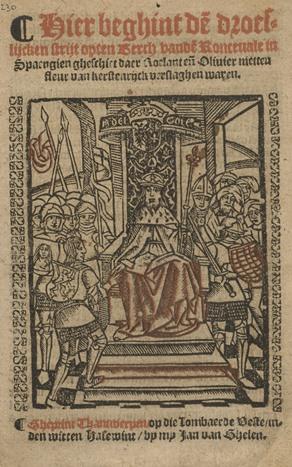A Rare Roland
 The newly acquired book is a Dutch version of the well-known Old-French Song of Roland, which goes back to the 12th century. It is an epic poem based on the Battle of Roncevaux Pass between the French and the Bask armies in 778, during the reign of Charlemagne. During the battle the hero Roland, a cousin of Charlemagne lost his life. The full title of the book is: Hier beghint den droeflijcken strijt opten Berch vanden Roncevale in Spaengien gheschiet daer Roelant ende Olivier metten fleur van kerstenrijck verslaghen waren. The book was printed in Antwerp in 1576 by Jan van Ghelen, who specialized in this kind of courtly epic. It is actually a reissue: around 1520 the Antwerp printer Willem Vorsterman already published the text. Only one copy of this edition, which is kept in Munich, is known to have survived.
The newly acquired book is a Dutch version of the well-known Old-French Song of Roland, which goes back to the 12th century. It is an epic poem based on the Battle of Roncevaux Pass between the French and the Bask armies in 778, during the reign of Charlemagne. During the battle the hero Roland, a cousin of Charlemagne lost his life. The full title of the book is: Hier beghint den droeflijcken strijt opten Berch vanden Roncevale in Spaengien gheschiet daer Roelant ende Olivier metten fleur van kerstenrijck verslaghen waren. The book was printed in Antwerp in 1576 by Jan van Ghelen, who specialized in this kind of courtly epic. It is actually a reissue: around 1520 the Antwerp printer Willem Vorsterman already published the text. Only one copy of this edition, which is kept in Munich, is known to have survived.
The song of Roland is partly based on historical facts of the 8th century. After a military campaign in Spain against the Basks, Charlemagne had to return to the North to defend his empire from the marching Saks. While disengaging his troops through the Pyrenees, Charlemagne’s rear-guard lead by Roland was attacked by the Basks – in the book the Basks are turned into Saracens in order to place the epic story within the context of the struggle between Christianity and Islam. Roland and his adjutant Oliver and their troops were cut to pieces. Therefore, since the middle ages Roland’s name and epic fall are identified with the chivalric ideal.
The author of the Dutch version did not base himself directly on the Old French Song of Roland, but rather on a late Latin chronicle. The translator of the text amply used his imagination, as was usual with most epic poems printed in Antwerp during the Renaissance. By combining information from different sources and by mixing prose and poetry he emphasized the particular aspects of the story which his audience preferred. Click here to access the digitized version of the book.
Provenance
The copy the Heritage Library acquired comes from the collection of the man of letters Léonard Willems (1864-1938). Probably the book stems from the collection of his father, the famous bibliophile Alphonse Willems (1839-1912). In 1939 it was auctioned by the well-known Dutch antique dealer Menno Hertzberger (lot nr. 76). Based on the ex libris designed by the graphic designer Wim Zwiers, it also belonged to the Dutch politician Hans de Koster (1914-1992).
Only one other copy of the book is known to have survived and is actually kept in the Library of Congress in Washington. This copy stems from the collection of the Dukes of Arenberg and was sold to the American collector Lessing J. Rosenwald. He donated the book, together with hundreds of other rare books to the Library of Congress in Washington.
Knights in the library
The Roncevale is the fifth epic poem printed in Antwerp in the 16th century the Heritage Library Hendrik Conscience acquired in the past fifteen years, often with the help of the Patronage Fund. This small, but important collection will be at the basis of an exhibition in December of 2020. This exhibition will shed light onto less known several aspects of this kind of literature. Usually epic poems or chansons de geste are associated with the Middle Ages, but it appears they were still very popular during the Renaissance. The exhibition will investigate why some chivalric stories, like Karel ende Elegast, are still known today in a wider audience, whereas other stories, like Jonathas en Rosafiere, are only known to experts. On the one hand, some epic poems, but a few fragments, have even completely disappeared. On the other, once in a while new epic poems come to the surface. In 2016 the Heritage Library, again with the help of the Patronage Fund, bought the only known copy of Die historie van Galien rethore. Before this edition turned up at an auction, Neerlandists were not even aware of the fact that a Dutch translation of this French romance of chivalry existed.
Further reading
- Luc Debaene, De Nederlandse volksboeken. Ontstaan en geschiedenis van de Nederlandse prozaromans, gedrukt tussen 1475 en 1540. Hulst : Merlijn, 1977, blz. 165-172.
- Gerrit Jacob Boekenoogen, Den droefliken strijt die opten bergh van Roncevale in Hispanien gheschiede daer Rolant ende Olivier metten fluer van kerstenrijc verslagen waren. (Nederlandsche Volksboeken, 1). Leiden : Brill, 1902.
- P. Delsaerdt, Bibliofilie en publiek-private samenwerking : de veiling-Van Havre en de start van het Bestendig Dotatiefonds, 1905. Antwerpen : Dotatiefonds, 2008.


